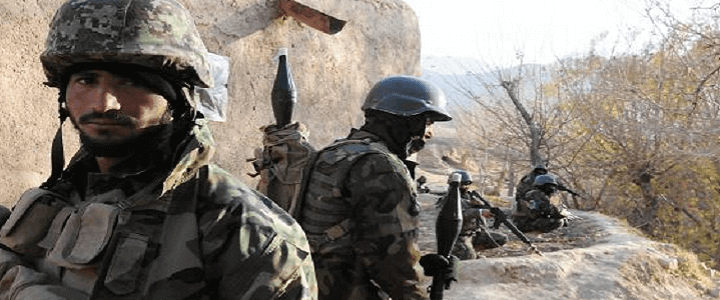Is Hamdullah Mohib, Afghanistan’s former ambassador to the U.S. and current national security adviser, out to undermine U.S. Special Representative for Afghan Reconciliation Zalmay Khalilzad? And if so, is he getting help from Washington think tanks? Because from the cheap seats, it sure looks that way. Based on a State Department statement, it may look that way from Foggy Bottom, too.
Khalilzad, a veteran diplomat, is back in Washington after wrapping up a recent round of talks with the Taliban—productive talks if you believe Khalilzad—and the knives are out. On March 12, Khalilzad posted a series of tweets outlining what he believes is progress in the ongoing U.S.-Taliban peace talks in Qatar. Khalilzad reported that conditions have improved and “It’s clear all sides want to end the war.”
Peace, he wrote, depends on four conditions: counterterrorism assurances, troop withdrawal, “intra-Afghan dialogue,” and a comprehensive ceasefire. U.S. and Taliban negotiators agreed “in principle” on all four points in January. Khalilzad now says they’ve agreed “in draft” on the first two. Once the two sides reach draft agreement on the dialogue and a ceasefire, the Afghan government will enter the negotiations.
Khalilzad is proceeding the only way he can. Obviously, the Afghan government must be part of the ultimate solution, and the ambassador is getting us there the only way he can: by conducting two-way talks that cut out the Afghan government. As long as he sticks to the insistence that the intra-Afghan dialogue begin before concluding any peace deal, this is a prudent step. You wouldn’t know that from what’s come out recently.
Mohib fires an undiplomatic shot
Speaking to CBS News on Thursday, Mohib said “”We think either Zal—Ambassador Khalilzad—doesn’t know how to negotiate or in fact there may be other reasons behind what he is doing.” Mohib’s anti-Khalilzad screed went so far as to accuse the ambassador, who was born and raised in Afghanistan, of wanting to lead Afghanistan as a “viceroy.” (Thanks so very much for injecting that word into the debate, Erik Prince).
Mohib’s remarks did not go unnoticed at the State Department. Under Secretary of State for Political Affairs David Hale “summoned” Mohib to the department’s headquarters “to reject the public comments.” When I was serving in Bosnia, a particularly intransigent mayor in my area (who, under the Dayton Accords, served only with the agreement of the peacekeeping leadership) received a visit from the British major general in charge of the region. According to the general’s aide-de-camp, the mayor “had his ears pinned back.” That phrase has never left me, and is likely an apt description of the one-way conversation Hale had with Mohib.
The State Department said that Hale also told Mohib “that attacks on Ambassador Khalilzad are attacks on the Department and only serve to hinder the bilateral relationship and the peace process.” Even for a diplomat, that’s pretty clear.
But Mohib appears to have friends in town who quickly took up the mantle. Dr. Michael Rubin, a scholar at the American Enterprise Institute and a former official in the Coalition Provisional Authority (the group that botched the post-invasion period in Iraq worse than Kenny Rogers’s plastic surgeon) took the the Washington Examiner to continue the attack.
In an article that reads as if Mohib dictated it, Rubin wrote, “Perhaps Mohib’s language was not saccharine enough for diplomatic snowflakes, but he was right,” before continuing the Afghan’s ad hominem attack on the man who has served as the U.S. ambassador to Afghanistan, Iraq, and the United Nations.
Dogpile on Zalmay
Not to be outdone, Thomas Joscelyn and Bill Roggio, both senior fellows at the Foundation for Defense of Democracies (which, to be frank, is one of my favorite DC think tanks), published another anti-Khalilzad article in Politico on Monday. While not waving Mohib’s flag so brazenly, the two nevertheless exaggerated the extent to which Khalilzad is willing to bend to the Taliban’s demands.
Let’s be clear: the only views we have into the Afghan peace talks are from the Afghan government (still rife with corruption, double-dealing, and backbiting), the Taliban, who have a clear motive to make it look as though they are getting the better of the U.S. team, and Khalilzad’s thin public comments. There is simply no basis to conclude at this point that “meaningful peace talks between the Taliban and Afghan government are not likely to happen,” or that Secretary of State Mike Pompeo is willing (despite the president’s well-known displeasure with the Afghan war) “to accept an exceptionally bad deal,” as the two FDD scholars contend.
The sad fact is that there are few “good guys” in Afghanistan. It is a country that has known nothing but war since the Soviet invasion in December 1979, and for whose people endemic corruption is not a problem to be confronted, but an aspirational goal. We ought to take everything every Afghan says with several grains of salt… Khalilzad included. But as I’ve said before, I saw the way the ordinary Afghan village elders responded to his overtures. I firmly believe he is America’s best bet for a negotiated settlement that can bring this war to an honorable conclusion.
Many Americans will likely not like Afghanistan’s future shape. But anyone who thought we were going to build a Jeffersonian democracy in such a place was fooling themselves. As long as we can secure the Taliban’s commitment to renounce violence, and their public renunciation of al Qaeda and other international terrorists, the rest is really none of our business.




